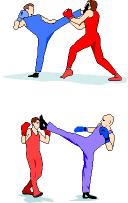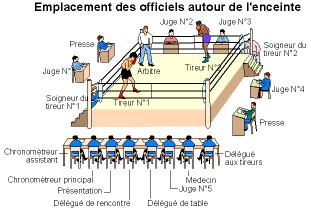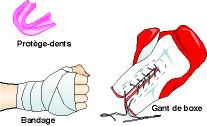| Happy Birthday : |

French boxing
32 000 redundant - 650 Club

Originally, the French boxing was not a sport but a formidable method of fighting called "shoe". Born in the street, it included all strokes used to put an opponent out of harm's way. Percussion hands, fists and feet, head, forearms, elbows, knees and legs, but also seized key bottlenecks, projections and capital, made the shoe terribly effective. Its transformation into a competitive sport (Savate French Boxing) led to depart from its practice techniques which may harm the physical integrity of opponents.
Savate French Boxingcombines the punches of boxing with kicking the shoe. The International Federation was founded in 1983.
• 1903: the early development of the French boxing in Europe. Is created in France, French Federation of Societies of Boxing which adhere to the French boxing and boxing.
• 1907: Georges Carpentier of France is champion of French boxing before turning to boxing where he will be the career that we know.
• 1965: under the influence of some "fans", which among other Dionnot Jean Richard Géneaudau Marc Kunstler, Bernard Plasait, Sylvain Salvini, Claude Simonot. A National Committee of French Boxing (CBBF) was established January 5. The President is founder Pierre Baruzy , 11 times champions of France middleweight and light heavyweight. The Honorary President is Georges Carpentier. The Executive Chairman Lucien Alliot. On 12 December the same year the CNBF is hosted by the French Judo Federation (FFJDA) as "associated subject.
• 1966: real beginning of the revival: the rooms are beginning to reopen, and Michel Marliere launches boxing in French university while Marcel Lesau the discover in schools. They are also the championships of France of the "Renaissance": the champions will Plasait Bernard (Nibs), Marc Kunstler (Light), Christian Cogis (Means), Denin (Light Heavyweight), and Jean Laffond (Heavy).
• 1974: FNBF the left Judo Federation. Pierre Baruzy ensures the creation and official recognition of the FFBF.
Some benchmarks:
1800: In northern France, a method of combat using the hands and feet appeared: Savate is born.
1832: In the suburbs of Paris, the rooms open; Charles Lecour, strong knowledge in boxing, mixes combinations using the feet. This method of defense is quickly becoming popular, we now speak of "French boxing.
1877: With Charlemont, hard sport, the moves are codified techniques studied. Enthusiasm for the subject continues to progress ...
1900 ... resulting in the creation of 1 WorldChampionship.
1903: Boxing and boxing meet the French within the French Federation of Societies of Boxes.
1924: Confirming its success, the French boxing is a demonstration sport at the Summer Olympics held in Paris.
1944: Following the war, the French boxing is in decline. The discipline was then revived under the leadership of Count Pierre de Baruzy ...
1966 ... The clubs are growing; Savate is a sport for educational purposes. It is practiced in schools and universities.
1975: There are 3500 registered licensees in 125 clubs. The Ministry of Youth and Sports gave the delegation of powers to the National Federation of French Boxing Federation to become the French Boxing & Associated Disciplines.
1982: 1st Championship of France feminine 1st European Cup held in Paris. International meetings are organized. Savate is used by 20,000 licensed!
90 Years: The Federation is a true center for training, appropriate structures are created, diplomas federal reform. The Youth & Sports Ministry recognizes the highest level. The disciplines involved are growing. Organization moult national and international competitions.
2005: The Federation Reaches Milestone of 35,000 licensees. It is estimated to double the number of practitioners.
Country practitioners: Algeria, Argentina, Armenia, Australia, Belgium, Bosnia-Herzegovina, Brazil, Bulgaria, Cambodia, Cameroon, Canada, Chile, China, Colombia, Croatia, Cuba, Estonia, Finland, France, Gabon , Ghana, Great Britain, Greece, Guinea, Hungary, India, Indonesia, Mauritius, Iran, Ireland, Italy, Japan, Korea, Lebanon, Madagascar, Morocco, Mauritania, Mexico, Moldova, Montenegro, New Zealand, Netherlands, Poland, Portugal, Qatar, Russia, Senegal, Serbia, Slovenia, Sudan, Sweden, Switzerland, Thailand, Tunisia, Turkey, Togo, Ukraine, USA, Venezuela, Vietnam.
The French Federation of Savate French Boxing and Associated Disciplines is also:
650 Clubs 38,000 licensed competitive practices 3: assault, fighting, stick fighting 35% of women 37% under 18 years 26 leagues 62 departmental committees
Some famous practitioners:
Ernest Hemingway - Georges Carpentier - Alexandre Dumas - Theophile Gautier - Eugene Sue - Marcel Pagnol and Olivier Lapidus ...
Rules and Principles PrincipleSavate French Boxing is taught and practiced on the basis of the method of Master Charlemont. There are two different practices of French boxing. The best known is the battle. It is an activity reserved for the elite. The attack is another form of practice. These are meetings where the person tries to touch each other but should never support his shots. Natural extensions of the arm, the rod and the rod, are disciplines that may be associated with the practice of Savate French Boxing.
RulesFrench Boxing is a combat sport using percussion movements called "strokes" that can strike with different surfaces of the front feet and fists.
The kicks can use three principles:
- The strike by whip movements "scourge" or "whip"
- The direct hit by thrown: movements of "piston" or "rod-piston"
- The strike by swinging: movements of "slingshot".
Based on these three principles mechanical
It distinguishes 6 categories BFS kicks:
1. The whip kick (right)
2. The kick whipped in reverse by using the hit whipped.
For both categories, the hips are necessarily placed in profile at the time of the strikes and their final path should be lateral.
3. The kicking driven using the direct hit by thrown.
4. The kick swung into reverse.
5. The kick down (typing or unbalanced) using the balance struck by.
6. Kicking back in groups whose performance uses mainly the principle of efficiency Throw direct but also that of whipped (reverse).
Principles of mechanical performance of punches and classificationThe punches can use two principles:
- Hit by thrown Direct: movement of "piston"
- Hit by swinging: movement of "slingshot".
Based on these two principles, there are 4 types of punches:
1. the direct use direct hit by thrown
2. The brackets combine swinging and threw Direct
3. the uppercuts
4. using the swing hit by swinging.
Permissions and prohibitions in competition at BFS1. The area allowed to be touched or affected are:
For kicks:
- The anterior and lateral sides of the head
- All sides of the trunk and lower limbs.
For the fist:
- The anterior and lateral sides of the head
- The anterior and lateral sides of the trunk.
2. The area closed to be affected or are affected:
a) For kicks:
- The triangle genital
- Neck, back, top of head
- The chest for women.
b) For the fist:
- Men's: all shots given under the belt line (boundary formed by the iliac crests).
- Women's: all shots to the chest and under the belt line.
3. Assault and techniques described in the preceding paragraphs are only allowed to compete for BFS, all other forms of strokes and techniques are prohibited.
4. The training kicks are not limited but their use should not predominate over the chains of feet and fists punched-feet.
5. The mowing and scans are allowed.
6. It is forbidden to lay hands on the ground or on the ropes to hit.
7. It is prohibited:
- Of blows taking the opponent
- Run time control whatsoever
- Pushing or pulling the opponent.
8. It is forbidden to move in a dangerous manner: head forward, knees up.
9. It is prohibited:
- Hit a shot down or being observed,
- To strike an opponent engaged in the strings.
The enclosureA square having the dimensions between the following strings:
- 6 m up the side;
- 4.90 m square minimum.
Will be surrounded by three rows of heavy hemp ropes with at least 2 cm and 3 cm in maximum diameter and surrounded by fabric or plastic.

The strings must be at least 0,30 m poles, if any, and the corners will be reimbursed from base to summit by a cushion of strings of protection.
Equipment Gloves- They will be in very good condition, leather or similar material uniformly upholstered horsehair (or similar material).
- They must weigh:
- 6 to 8 ounces (171 and 228 g) for fencers "young" ( "Mosquito" to "Mini Light (es);
- 8 ounces (228 g) for shooters weighing 48 to 63 kg ( "flies" to "light") and for printers weighing 45 to 64 kg ( "mini-light" to "super-feather");
- 10 ounces (285 g) for shooters weighing 63 to 78 kg (super-light "to" medium ") and for printers weighing over 64 kg (" light "to" Medium ");
- 12 ounces (342 g) for shooters weighing over 79 kg ( "mid-heavy" and "heavy");
- They must be of "approved" Savate French Boxing, that is to say, include a "double cuff" fully protecting the wrist and the start of the forearm (10 cm).

.
Patterns separated now. See the two pictures attached. Here: Diagram of the bandage.
- Every shot has the right to put bandages on his hands.
- They must be made only by bands "surgical" type pancake Velpeau "2 m long and 4 cm wide. Bands like "Somos" are also accepted.
Footwear- The shoes have an upper and a vamp made of flexible material (leather or skin, or not returned).
- The soles, rigid but not hard, with a thickness of 2 to 5 mm, is flat, no heel or heel, not overwhelming, and can cover the inner edge of the 1 / 3 up front about 2 cm.
- The wound is closed by laces or without hard tips carnations, which node will be located behind the stem. It is recommended to protect the lacing of "catnip".
- The stem semi-long "comes to the next level of malleoli.
- The front end of the upper is rounded as possible, and is "padded" with a thin layer of "latex" (or any other similar material and protective).
- A single layer protective double inside any shoe.
HoldingThis required "full", consisting of a set, sleeveless, one piece covering the legs and chest, is also required for participation in all events Savate French Boxing: meetings, demonstrations, workshops, examinations.
The weight categories:
Flyweight: under 48 kg (only for women)
Roosters: 48 to 52 kg (only for women)
Featherweight: under 56 kg
Light: 56 to 60 kg
Super-lightweight: 60 to 65 kg
Mi-Resources: from 65 to 70 kg
S / M / Means: 70 to 75 kg
Means: 75 to 80 kg
Light Heavyweight: 80 to 85 kg (for men)
Heavy: more than 85 kg (for men)
Savate includes 4 different sports:
Ø French boxing
The Assault: This is a form of encounter with the "key", where all power shots is excluded: the search "Hors Combat" is therefore completely prohibited. This kind of confrontation on the majority of our licensees, including women and youth. The assault is the only option for those under 18 years of conflict with other shooters.
The Battle: This is a form of meeting where the power of shots is permitted. However, ports of mouthguards and the shell (or protects the chest) are mandatory.
Ø Savate Forme
Savate Forme, it's Savate music without objection. Discipline forms the border between combat sports and fitness, it is open to everyone, even those that any idea of combat is thrilling! It is undoubtedly the preferred approach to the French boxing today. Practiced with intensity, can also form savate training aerobics specific competitor and a repeat gestures that refines his technique.
Ø Savate Defense Baton
Savate stick defense and defense are forms of practice which aims to enable learning techniques to develop competence in self-defense. The training in Savate defense and stick defense aims to develop the capacity of practicing reaction against aggression with or without a weapon. Its specific pedagogy takes into account the parameters involved in aggression, including the psychological aspect to be addressed through role playing. Savate defense and the defense staff are also a good way to develop their physical capabilities.
Ø The Cane fighting
To combat cane or cane gun and the stick, often referred to French martial art, although coding as a sport does not allow the formal application. Clothing accessories and fashion effect at the beginning, formidable weapon of defense or attack for those who could handle it, the stick and the stick are now practiced as sport.
Competitions Meetings
We distinguish Savate French Boxing in three types of encounters:
1. The duo: a form of encounter that combines two shots of the same sex or different sexes, moving together to present a performance art and aesthetics.
2. The assault is a meeting which is judged on technique and accuracy of shots whose power must be carefully controlled to exclude any risk of injury or put "out of combat.
3. The battle is a form of meeting which is to add the technique and precision of attack sufficient energy so that the blows are worn effectively. Depending on the degree of shooters, there are:
The battle 2nd series which is held with a double and scoring when wearing a helmet and shin guards is mandatory.
The fight 1st round national series and whose decision is determined by a single note and where helmets and leggings is prohibited. For women, only the 2nd Combat series, in this case called "female combat is permitted.
Competing form of assault or combat encounters between man and woman and meetings of more than 2 persons are prohibited.
TakeoversThe duration of occasions:
Depending on the specific regulations of the competition events are held in 5 times in 2 minutes time "owner" of boxing (the referee stops counted at his command). Repeats are separated by an interval of 1min said "min rest" which belongs to the shooters and their seconds.
Copyright Sportquick/Promedi

 |
Champion du monde des mi-moyens en 1993 et 1995 et champion d'Europe en 1992 et 1994. Champion de France en 1992, 1963, 1994 et 1995. Copyright Sportquick/Promedi... |
 |
Championne du monde des plumes en 1995 et d'Europe en 1996. En 2000, elle remporte la Coupe du monde. Plusieurs fois championne de France. Copyright Sportquick/Promedi... |
 |
Championne du monde des légères en 2000. Championne de France en 1999. Copyright Sportquick/Promedi... |
 |
Championne du monde des mini-légères en 1995, championne d'Europe en 1996 (2e en 1998) et championne de France de 1994 à 1996. Copyright Sportquick/Promedi... |
 |
Championne du monde et de France des super-plumes en 1995. Vice-championne d'Europe en 1996. Copyright Sportquick/Promedi... |
 |
Championne du monde des coqs en 1997. Plusieurs titres en championnat de France. Egalement championne du monde de kick-boxing et de boxe thaïe. Copyright Sportquick/Promedi... |
 |
Championne du monde des super-légères en 1999 et d'Europe des légères en 1996. Copyright Sportquick/Promedi... |









